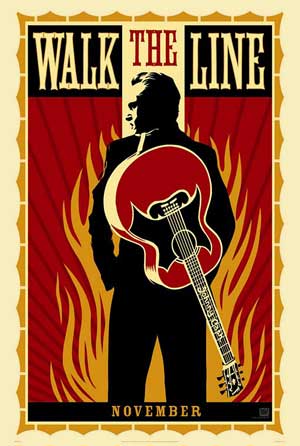 You should know that if, after seeing Walk the Line, you want to buy Johnny Cash albums you’ll have to go to the country section of your local record store. I say that because as I left the screening of the biopic I realized most of the movie had tried to keep Cash as far from country music as possible.
You should know that if, after seeing Walk the Line, you want to buy Johnny Cash albums you’ll have to go to the country section of your local record store. I say that because as I left the screening of the biopic I realized most of the movie had tried to keep Cash as far from country music as possible.
Cash was a crossover artist, there’s no question about it. And he was an artist who made a huge and influential splash in his genre, changing lots of things. But his genre was country, no matter how many rock ‘n rollers claimed him as one of their own. Sure, he had a rock attitude at times, but he sang country music.
To me this epitomizes my problem with the film. Walk the Line is a by the numbers musician biopic, a movie that does nothing to show the unique aspects of who Johnny Cash was. Distancing him from his country roots only further genericizes the man’s story.
Like last year’s Ray, Walk the Line has a strong central performance (actually two in this case) that services a very standard story which trudges through all the checkpoints: poor childhood and early musical affinity; early tragic event (death of a brother in both films); hardscrabble living while attempting to break into the music biz; sudden fame that comes with a drug problem; final cleaning up that serves as the triumphant finale. Walk the Line does make one interesting deviation from the formula – more on that later.
Joaquin Phoenix has been garnering more buzz than a beehive with his portrayal of Johnny Cash. It’s often a great performance in that he seems to just become Cash, but it’s not consistent. When Phoenix is really in character you just buy it, but sometimes he seems to be struggling with the persona.
Reese Witherspoon never has that problem. She delivers the best performance of her career, magically capturing the turmoil in June Carter as she deals with her feelings for Cash. June could have just been a supporting female character, but Witherspoon battles the constraints of the role and brings all three dimensions of the woman to the screen. And she does her own singing, and she does it well.
She and Pheonix both seem to be struggling against the staid aspects of James Mangold’s directing. The heart of the film is the story of Johnny chasing June, who refuses his hand in marriage for years as he spirals into drug-fueled self-destruction. This is the one place where the film feels like it’s not just being a paint-by-the-numbers biopic – there’s something creepy about the way Cash keeps coming after June for years and years and years. He’s sort of a stalker. It’s refreshing.
There’s a lot to like in the film. The performances are great. The music, of course, is amazing, if really skewed to the crossover appeal songs. Best of all is the way the film shows us the early years at Sun Records, where rock and roll was born – the artists on the label brought country and rockabilly and the blues and gospel together to form this mongrel music. The film is exhilarating while following these giants, and the portrayal of Jerry Lee Lewis perfectly captures his specific brand of being fucked up.
But again, while Cash was part of that gumbo that birthed rock and roll, he was a country artist. The film is happy to identify him with that early movement, but it has to ignore huge aspects of the rest of his career to keep him less country. Bob Dylan gets name dropped again and again, and even has songs played, but when Cash shares an apartment with country superstar Waylon Jennings we don’t even get to hear his full name.
The biopic has become the stalest genre in film these days. Not every movie needs to span a whole life – Walk the Line would have been more successful if it had done what this year’s Capote did, and focused on one aspect or time period. It’s the fractal theory of biopics, and it’s the one that makes for the best movies. Walk the Line isn’t a bad film, but rather a frustratingly standard one.